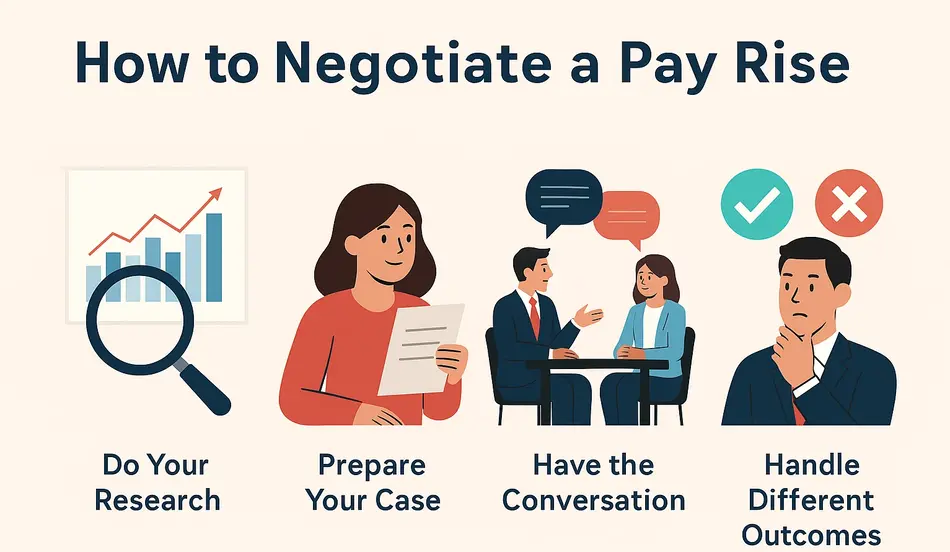Introduction
Negotiating a pay rise can feel daunting, but it’s a crucial part of professional growth. Whether you’re an early-career professional or a seasoned employee, knowing how to ask for a pay rise in the UK workplace context is vital. A successful negotiation can not only boost your earnings but also reinforce your value within your organisation. In this guide, we’ll walk you through everything you need to know, from preparation and timing to what to say during the conversation. You’ll also learn common pitfalls to avoid and see real-life examples to help you feel more confident and prepared.
The UK’s professional landscape has evolved, and advocating for fair compensation is increasingly recognised as a necessary and respectable part of career development. This article empowers you with the tools, knowledge, and confidence to enter salary negotiations fully prepared, helping ensure that your earnings reflect your skills, experience, and contributions.
Table of Contents
Understanding the UK Salary Landscape
Before initiating a salary negotiation, it’s essential to understand your market worth. Tools like Glassdoor UK, Payscale UK, and the UK Government’s Annual Survey of Hours and Earnings (ASHE) offer valuable benchmarks. Consider industry, region, and company size, as these factors significantly impact salary ranges.
- Industry Averages: Salaries vary widely across sectors. For example, roles in finance, law, and technology often command higher base salaries, bonuses, and structured raise policies due to the competitive nature of these fields. Public sector roles, while more stable, may follow stricter pay scales.
- Location Matters: London and the South East of England typically offer the highest salaries to compensate for higher living costs. In contrast, similar roles in the Midlands or Northern England may offer less but provide better value in terms of cost of living.
- Seniority and Experience: Professionals with niche technical skills, certifications (e.g., PRINCE2 for project management or ACCA for finance), and a proven track record are better positioned to request above-average salaries.
Tools to Use:
- Glassdoor UK for employee-reported salaries and reviews.
- Payscale UK for customised salary reports.
- Gov.uk ASHE for authoritative national wage statistics.

Step-by-Step Guide to Negotiating a Pay Rise
1. Timing is Everything
Choosing the right moment is critical. The ideal time to request a raise is:
- Post-Achievement: After completing a major project, hitting key performance indicators (KPIs), or receiving positive performance feedback.
- Annual Reviews: Most UK companies conduct yearly appraisals, making this the most common and appropriate time.
- When Taking on New Responsibilities: If your role has expanded significantly, it’s a strong argument for increased pay.
Avoid times of company budget cuts, restructuring, or when your manager is under pressure.
2. Do Your Homework
Preparation is the foundation of a successful negotiation. Gather compelling evidence of your impact:
- Quantify Achievements: Use metrics where possible, such as “increased website traffic by 40%” or “reduced client churn by 15%.”
- Client Testimonials and Manager Feedback: Positive third-party validation reinforces your claims.
- Peer Comparisons: Know how your performance stacks up internally.
Organise your accomplishments in a portfolio or a one-pager for presentation.
3. Benchmark Your Salary
Don’t rely on anecdotal evidence. Use credible salary tools to benchmark:
- A Software Engineer in Manchester typically earns £45,000.
- A Marketing Manager in London can expect around £55,000 to £65,000, depending on the sector.
Having specific figures strengthens your negotiation and shows you’ve done your research.
4. Draft Your Talking Points
Prepare a structured script to keep your discussion focused and confident:
- Begin with appreciation for your role and the company.
- Clearly state your request, e.g., “I believe a salary adjustment is appropriate given my performance and the market rate.”
- Present your achievements and market data.
Avoid emotional appeals; stick to data and outcomes.
5. Schedule a Formal Meeting
Set a professional tone by scheduling a dedicated meeting. Use a clear and respectful subject line like: “Discussion: Performance and Compensation Review”.
Give your manager enough notice and ideally send a short agenda beforehand.
6. Practice Your Pitch
Confidence comes from preparation. Rehearse with:
- A mentor or trusted colleague
- Record yourself and evaluate tone and clarity
- Practice handling potential objections (e.g., “budgets are tight”)
7. Be Ready for Any Outcome
Sometimes the answer may be “not now.” If so:
- Request feedback on what’s needed to justify a raise in the future.
- Ask for non-monetary compensation such as extra leave, flexible hours, or learning opportunities.

Common Pitfalls and How to Avoid Them
1. Going in Unprepared
Arriving without evidence or a clear rationale undermines your request. Always bring:
- A summary of your accomplishments
- Market salary comparisons
- A confident, professional attitude
2. Using Ultimatums
Statements like “I’ll leave if I don’t get a raise” rarely result in a positive outcome and can damage relationships.
3. Poor Timing
Asking during financial downturns or team crises shows a lack of awareness. Monitor internal and external signals to gauge timing.
4. Making It Personal
Keep the conversation professional. Avoid referencing personal bills or life expenses.
5. Lack of Confidence
Displaying doubt or hesitation may lead your manager to question your readiness for a raise. Practice your delivery until it feels natural and assertive.

Real-Life Examples and Scenarios
Scenario 1: Post-Promotion Raise
Emma, a project manager in Leeds, successfully led a six-month digital transformation initiative that resulted in 30% process efficiency. She compiled performance metrics, customer satisfaction scores, and internal endorsements. Her structured pitch led to a 10% pay rise and a new leadership title.
Scenario 2: Mid-Year Performance Boost
David, a sales executive in Birmingham, exceeded his quarterly revenue target by 35% through strategic client acquisitions. Despite the annual review cycle being months away, he requested a special review supported by documented wins and market salary benchmarks. Management agreed and increased his base salary by 7%, with an added performance bonus.
Scenario 3: Template for Email Request
Subject: Request for Compensation Discussion
Hi [Manager’s Name],
I hope you’re well. I’d like to schedule a meeting to discuss my current compensation in light of recent performance milestones and evolving market benchmarks. Please let me know a convenient time for you.
Best regards,
[Your Name]
Use this template to set a professional and respectful tone for your conversation.
Useful Resources and External References
- CIPD UK: – The Chartered Institute of Personnel and Development offers research and policy insights on workplace trends and employment standards.
- Glassdoor UK: – Get salary data, employee reviews, and company ratings.
- ACAS UK: – Provides impartial advice on workplace rights, rules, and best practices.
Conclusion and Call to Action
Negotiating a pay rise is a vital skill for career progression. By understanding your value, preparing thoroughly, and approaching the conversation with professionalism, you increase your chances of success. Remember: the worst they can say is no, but even then, you’ve opened a dialogue about your future.
Take action today:
- Review your accomplishments
- Benchmark your salary
- Draft your pitch and practice
Explore more career advice on WhatJobs.com/Info/Career-Advice or subscribe to our newsletter for weekly tips from career experts.
Ready to make your next move? Let us help you find your next big opportunity.
Frequently Asked Questions
When is the best time to ask for a pay rise in the UK?
Timing is critical when negotiating a pay rise. The most effective moments typically include after a successful project completion, during your annual performance review, or when you’ve taken on significantly more responsibilities. These times allow you to highlight recent contributions and align your request with the company’s standard review process.
Avoid asking during periods of organisational stress such as budget cuts, layoffs, or just after the company has missed financial targets. Not only is your request more likely to be denied, but it may also be perceived as insensitive.
How much of a raise should I ask for?
The amount you should request depends on your industry, role, location, and contributions. A common range for a raise in the UK is 5% to 10%, although it can go higher if you’ve taken on new responsibilities or your role has evolved significantly.
Start by researching market salaries using tools like Glassdoor UK or Payscale UK. Compare your current salary against the average for similar roles in your region and sector. If your pay is significantly below market rate and your performance justifies it, you may consider requesting a larger increase.
What should I say during the negotiation?
During a salary negotiation, clarity and professionalism are key. Begin by expressing appreciation for your role and responsibilities. Transition into your case with a statement like: “I’d like to discuss my current compensation in light of my recent contributions and market data.”
Focus on achievements—quantified where possible—such as revenue increases, cost savings, successful projects, or client feedback. Avoid personal financial reasons (e.g., higher rent), which shift the focus from business value to personal need.
What if my request for a raise is denied?
If your request is denied, remain composed and professional. Don’t view it as a closed door but as an opportunity for feedback and future growth. Ask clarifying questions like: “Can you help me understand what factors influenced this decision?” or “What milestones would support a salary review in the next six months?”
Seek constructive feedback and a timeline for reassessment. This shows initiative and willingness to improve. Document the conversation for future reference.
Consider discussing other forms of compensation. If a salary increase isn’t feasible, explore alternatives such as additional annual leave, professional development budgets, flexible working, or a performance bonus.






